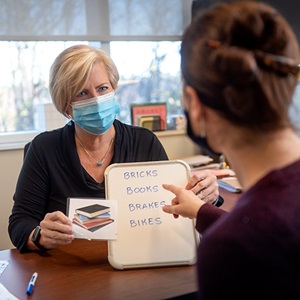Aphasia is an acquired language impairment typically resulting from stroke, traumatic brain injury or brain tumors, usually affecting the left hemisphere. There are different types of aphasia depending on what area of the brain is damaged and every individual with aphasia has a unique presentation of impairments. In general, however, a person with aphasia may experience trouble expressing themselves, understanding others, or reading and writing. Specific impairments with reading and writing are referred to as:
- Alexia – a partial or complete inability to read
- Agraphia – a loss in the ability to communicate through writing
Aphasia can also be the result of progressive, neurological conditions such as Primary Progressive Aphasia (PPA). PPA is a rare syndrome that affects the ability to communicate. It can affect both comprehension and expression. Symptoms begin gradually and worsen over time.
If you or a family member are experiencing difficulty with your communication, our team of speech-language pathologists can complete a formalized language evaluation to best determine the presence and type of impairment and develop an individualized treatment plan to target your specific communication needs.
Language Evaluation: What to Expect
During your initial evaluation, a specialized speech-language pathologist will interview you and/or your caregiver about your communication concerns, including an analysis of your specific communication needs and individual goals. They will then complete a thorough evaluation of your language skills using appropriate standardized and functional measures to best determine your communication strengths and weaknesses. This information will be used to develop an individualized treatment plan.Language Treatment
 Treatment of language disorders is tailored specifically to the patient’s individual impairments and functional communication needs and typically includes a variety of approaches with the ultimate goal of maximizing communication success and overall quality of life. Specific treatments may include:
Treatment of language disorders is tailored specifically to the patient’s individual impairments and functional communication needs and typically includes a variety of approaches with the ultimate goal of maximizing communication success and overall quality of life. Specific treatments may include:
Restorative Treatments: This approach is aimed at restoring impaired language functions. The clinician will used evidence-based techniques to directly stimulate specific listening, speaking, reading and writing skills through a variety of tasks.
Compensatory Treatments: This approach is aimed at enhancing communication by any means available. These therapies often involve more natural interactions relating to real life communicative challenges and often include training the use of augmentative and alternative communication supports. Augmentative supports can be low-tech or high-tech and may include:
- Training the use of gesture and/or pointing
- Paper-based picture and/or writing supports
- Computer-based speech-generating devices
Communication Partner Training: As a part of this approach, caregivers, friends, and family are trained to use a variety of multi-modal communication strategies to optimize the person with aphasia’s ability to express and/or understand information
A significant component of aphasia treatment also involves community support and integration programs. Our speech-language pathologists will work closely with patients and caregivers to provide education on appropriate community resources as well as opportunities for ongoing communication opportunities beyond individual therapy such as local aphasia and/or communication groups.
